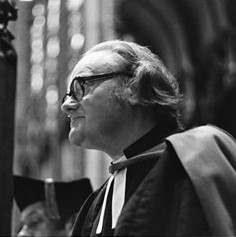 Erik Routley (1917-1982)
Erik Routley (1917-1982)
As churches face new circumstances in unusual times, the wisdom of Erik Routley offers some possible solutions. Thanks to Nancy Graham, currently working on his definitive biography, for locating this piece.
Why Not a Church Music Society?
Honesty in our worship music demands a maxim which most of us find not difficult to accept, namely, that
what we do should be done as well as possible. Yet another, which is not as easy, is to face our church as
to what it now is, not as it used to be or as we wish it were.
What is the choir supposed to be doing in our churches? It is primarily there, I think we say, to lead the
singing. Now the displeasing, but unmistakable, fact is that many of our churches cannot support a choir
that will lead the singing. Here and there you will find a well-trained choir of thirty or forty voices that
can produce the strong and homogeneous body of sound necessary if the congregational singing is to be
‘led’. But how much more often does the choir consist of five sopranos, three of whom weren’t at
practice, two altos, a tenor who should not be singing tenor, and two basses one of whom is not to be
trusted with an interval greater than a third? These faithful folk are sometimes under the pulpit,
sometimes in a chancel, or sometimes far above and behind the minister’s head. In any case, they are
often twenty-five feet, and sometimes farther, from the nearest member of the congregation. They may
know the music, but at that distance, and with uncertain resources, how can they help their neighbors
sing?
Suppose that somebody comes along who says, “Go and sit down there with your families and friends and
help them to sing.” I am suggesting just that to our struggling churches. Substitute the choir for a church
music society, or whatever you want to call it. The members of such an organization pledge to help with
the music, not just stay in the loft. Let all who can read music and hold a part come along on a regular
evening for an hour and let forty minutes of that time be given to the weekly hymns and psalms that the
musicians may ponder them, and where necessary, learn them. Let the minister be there to explain why
the hymns have been chosen and discern their difficult lines. Then on Sunday, these singers take their
place with their families and friends, singing confidently and happily, neither fettered by ignorance nor
puffed up by professionalism – the strong helping the weak. The choir was jam, but this music society
could be the yeast. Thus improved, this singing will deepen the consciousness that they are taking an
active and indispensable part in that great drama which is our worship.
Back to the rehearsal. The remaining twenty minutes can be spent on some close work on music which
they will perform by themselves on some high day -- carols at Christmas and Easter, a simple cantata, or
a series of anthems to make up a recital. This will give the musicians something to work for while removing
much of the spiritual wear and tear and the temptations to vanity and publicity. It will also abolish at a
stroke, the blasphemer who resigns if they are not given their fair share of solos.
Beyond all this, the little community will have the great advantage over the large and well-equipped
church. The dichotomy of choir and congregation, the artificial separation of worshippers, will not be the
rule, but the exception, and the singing body of the little church becoming the envy of the great church
which preserves the choral tradition.
Citation: Ministers Bulletin, March 1951. Published by the Life and Works Department of
the Congregational Union of England and Wales.